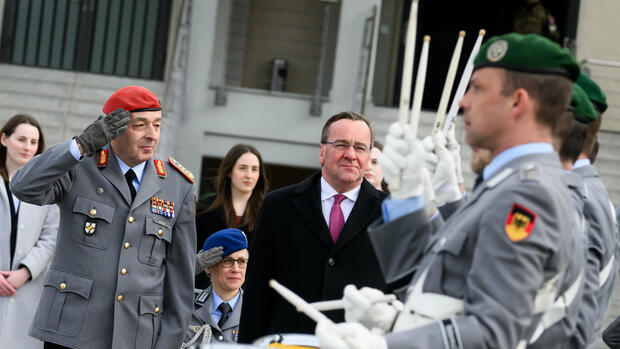Berlin Boris Pistorius is credited with saying that in administrative sciences you would fail in the first semester with the organization chart of the Ministry of Defense. The house with ten departments at two offices in Berlin and Bonn is hardly governable, say critics.
There is a culture of delegating responsibility. And 3,000 employees at two locations are “actually very many,” Pistorius told the “Spiegel”.
It is now becoming apparent that the head of department wants to thoroughly clean up before his first 100 days in office are over. The core element is the reintroduction of a central planning and management staff, which is to evaluate all submissions to the political leadership of the ministry and to the Inspector General and control them in terms of content and quality.
SPD man Pistorius had complained in a small circle about how many signatures were needed in his house before a proposal was ready for a decision. That should change now. “The planning staff improves political leadership,” says the President of the Society for Security Policy (GSP) and former military commissioner Hans-Peter Bartels. The staff looks at upcoming projects from the minister’s point of view and tries to balance competing interests in advance.
At the end of the 1960s, the then SPD Defense Minister Helmut Schmidt had set up a corresponding body, which was then abolished under Minister Thomas de Maizière (CDU) in 2012.
Read more about defense and the Bundeswehr
The reintroduction starts with the “much too large range of leadership” in the ministry and means more leadership skills for the minister and more commitment and result orientation in the processes, praised the defense policy spokesman for the SPD parliamentary group, Wolfgang Hellmich.
Officially, the Ministry of Defense did not want to confirm the plans on Wednesday. But you want to “become faster and less bureaucratic,” said a spokesman. The Association of Officials and Employees of the Bundeswehr (VBB) has already spoken out, which takes a critical view of the military-led planning staff and warns of the state secretaries in the ministry being “disempowered”.
In the future, the submissions to the political management of the house would go through a “military filter”, criticizes the interest group for civilian personnel in the Bundeswehr. And the offices of the state secretaries or the inspector general, which had been massively increased in terms of staff when the planning staff was abolished in 2012, are now to be thinned out again. As the “Bild” newspaper reports, around 160 of 370 positions could be cut in the management area.
“It is right that the minister is now quickly working through the omissions of the past,” said Marie-Agnes Strack-Zimmermann, Chair of the Defense Committee. Pistorius has her full support. “We clearly need fewer chiefs in the Defense Ministry.” The current personnel situation is in no way appropriate to the security situation.
However, the VBB complains that the ministry leadership has so far only communicated verbally about intended organizational changes. Pistorius, who previously headed the interior department in Lower Saxony, has experience of running a ministry himself and will therefore certainly ensure that the employees of the house are involved and involved, said the deputy chairman of the Green parliamentary group, Agnieszka Brugger.
“There are enough clever papers, what needs to change is practice.”
(Photo: IMAGO/Future Image)
“But it’s good that something is finally happening and that reforms aren’t being delayed again by some commission or a new strategy process.” There are enough smart papers, what has to change is the practice, said Brugger.
However, Pistorius has so far not been very squeamish when it comes to staffing his house – or he cannot prevent personnel decisions from finding their way into the press before he has spoken to those affected himself.
This is said to have been the case with Annette Lehnigk-Emden, who made Pistorius from Vice President of the Bundeswehr Procurement Office to President. Incumbent Gabriele Korb had to give way. Pistorius had previously put Inspector General Eberhard Zorn and State Secretary Margaretha Sudhof on temporary retirement. Since March 17, Carsten Breuer has been the new highest-ranking general to succeed Zorn.
>> Read here: New General Inspector: The troubled troops get a crisis manager
As the DPA agency reports, further personnel changes are already pending. Accordingly, Roland Börger, an expert from the ministry, is to become the new head of the Bonn Federal Office for Infrastructure, Environmental Protection and Services of the Bundeswehr.
The new head of department for infrastructure, environmental protection and services in the ministry will be Alexander Götz from Pistorius’ home in Lower Saxony, an expert on cooperation in civil protection.
Those familiar with the ministry assume that the personnel merry-go-round is far from over. Many top officials were appointed by Defense Minister Ursula von der Leyen (CDU) and are now serving the fourth minister.
The old culture of the house, which is now to be changed, is represented by State Secretary Benedikt Zimmer, who is responsible for armaments, and Department Head Carsten Stawitzki. Not everyone wants to bet that the new head of procurement, Lehnigk-Emden, will lead the Koblenz authority for a long time. She was better known for slowing things down during her time as vice president, critics say.
And when it comes to structural reforms, Pistorius is only at the very beginning – for example, when it comes to the question of whether all subordinate civil federal offices need their own ministerial departments.
More: Guest commentary Kersten Lahl: A hasty resumption of conscription does not strengthen the defense capability
First publication: 05.04.2023, 6:16 p.m.
